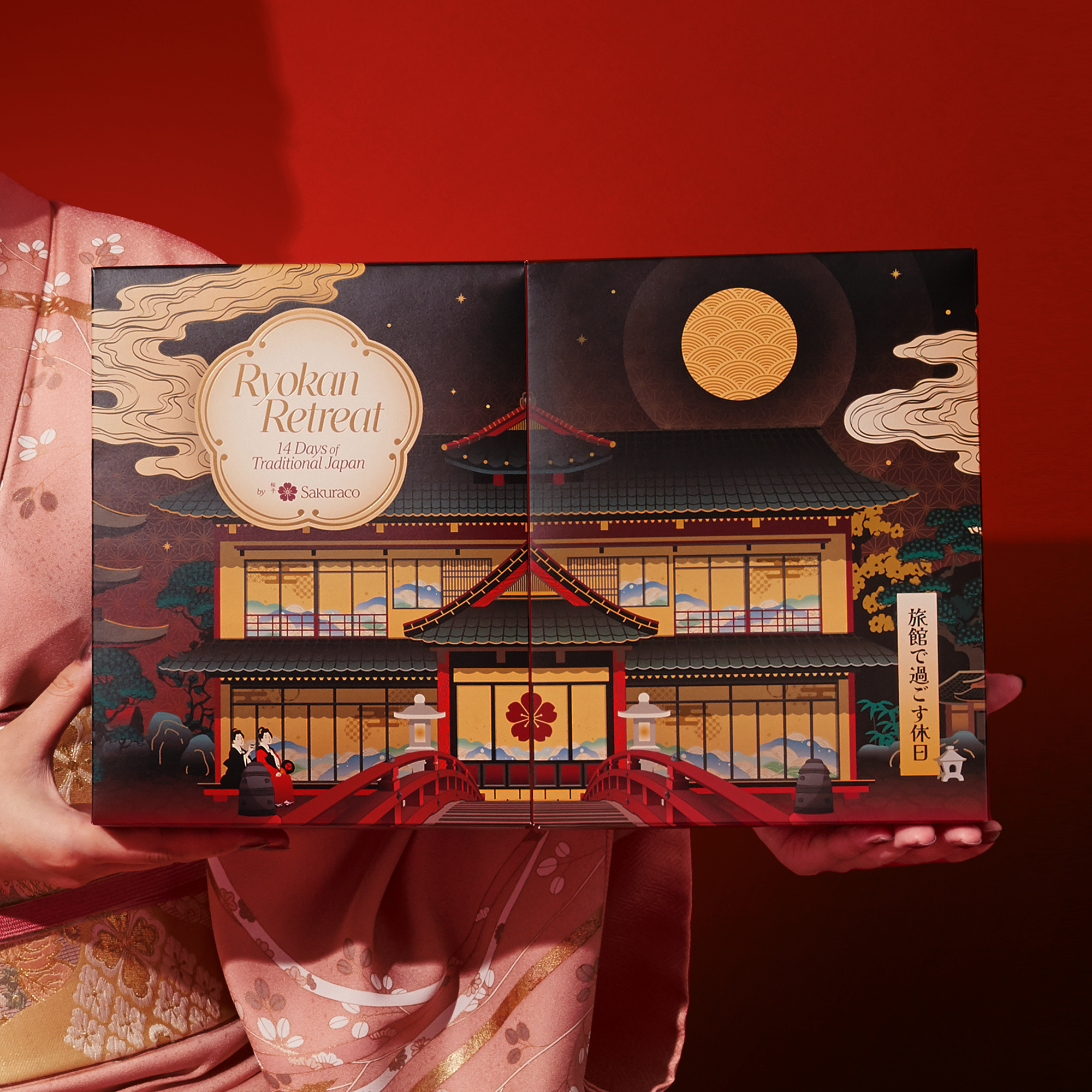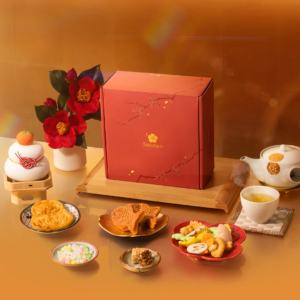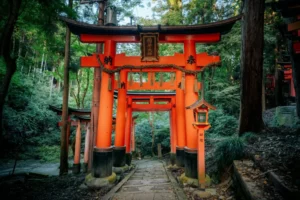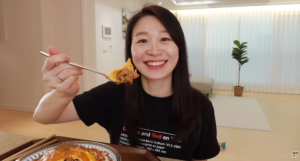Japanese symbols are rich in meaning and significance, deeply woven into the country’s culture and history. They serve as decorative elements in art and design and as powerful tools for conveying complex ideas, emotions, and beliefs. Let’s take a closer look at them.
Explore the deep significance of Japanese symbols with the 14-day Ryokan Retreat Advent Calendar. Each day you will discover that each door is carefully designed with a unique emblem or crest symbolizing iconic aspects of Japan’s culture. Symbols like the kitsune fox, representing prosperity, and the daruma doll, a symbol of good luck and happiness, along with many other meaningful Japanese designs that are beckoning you to discover the surprises behind them.
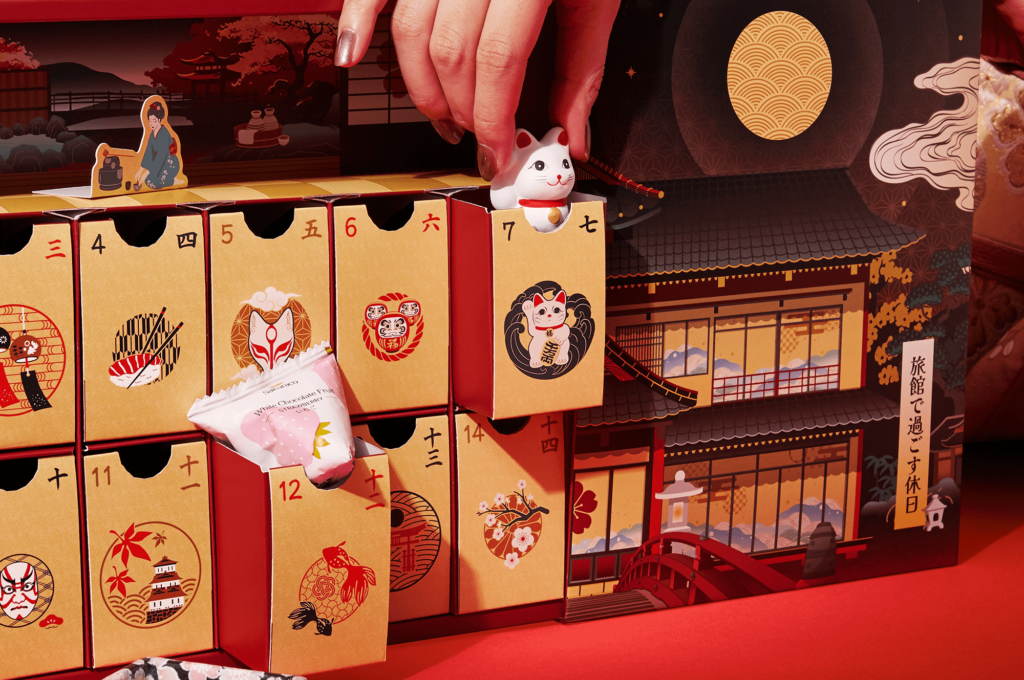
Table of Contents
ToggleJapanese Symbols in Nature
Japanese culture has a strong tradition of living in harmony with nature. You can see this connection in farming practices, like how rice is grown in terraced fields that fit into the mountains. This shows that people in Japan respect nature. Their appreciation for the environment is also seen in their art and design, which often focus on simplicity and the beauty of natural materials.
Fuji-san (winter)
Mount Fuji, Japan’s tallest mountain at 3,776 meters, is lovely in winter when it gets covered in snow, creating a stunning view against the bright blue sky. The air is crisp and clear from November to February, giving people great mountain views from places like the Fuji Five Lakes region and even Tokyo.
The mountain symbolizes many essential aspects of Japanese culture and identity. Many people throughout history have climbed it to reach enlightenment because they consider it sacred. Mt Fuji is also a UNESCO World Heritage Site and Japan’s national symbol.
Sakura (spring)
Sakura, or cherry blossoms, is another beloved symbol. They represent beauty, new beginnings, and the shortness of life. These delicate pink and white flowers bloom every spring, from late March to early April, creating breathtaking views throughout the country. People celebrate this beautiful sight with hanami or flower-viewing parties, where families and friends gather to enjoy picnics under the blooming trees.
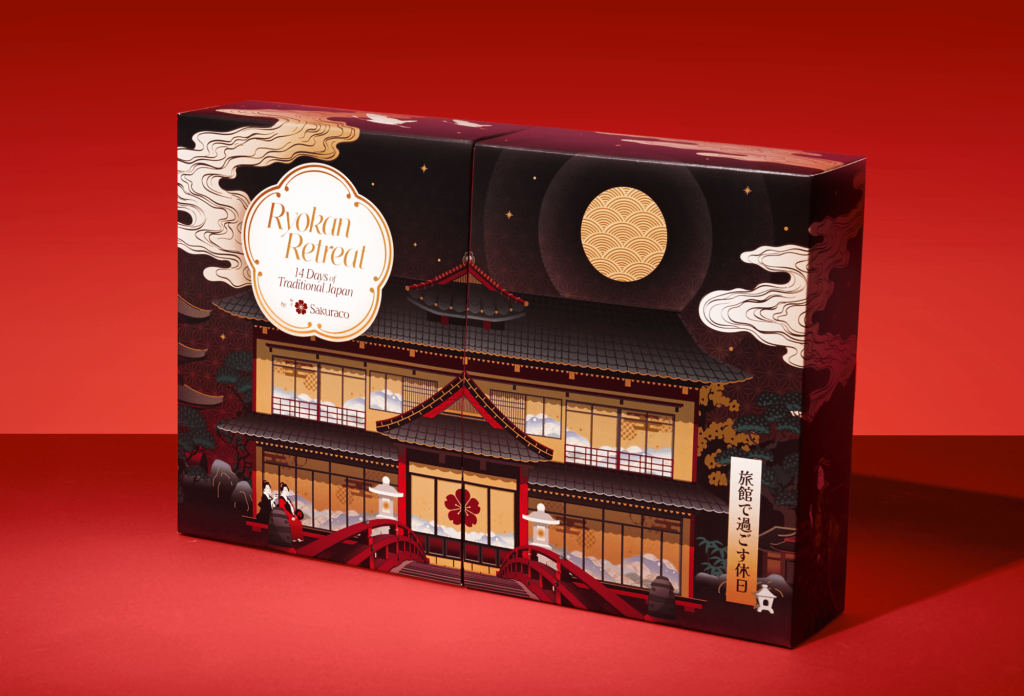
Ryokan Retreat: 14 Days of Traditional Japan
Experience the tranquility of Japan with the 14-day Ryokan Retreat Advent Calendar, a journey through a peaceful traditional Japanese inn. Each day unveils a new delight, from the soothing flavors of Japanese teas to the sweet indulgence of traditional wagashi to delightful Japanese snacks and treasures.
This advent calendar is perfect for those who cherish a slow, mindful journey through Japan’s traditions. It offers not only a collection of delightful treats and meaningful symbols but also a truly unique way to experience the heart and soul of Japan from the comfort of your home.
Japanese Symbols in Food and Drink
Ocha (Tea)
Tea is essential in Japanese culture and is more than just a drink. One of the most famous traditions is the Chanoyu ceremony, during which people prepare and serve matcha (powdered green tea) uniquely.
This ceremony is about being calm and respectful, helping people enjoy the moment. Tea is also a big part of everyday life in Japan. Many people drink green tea, known for being healthy, and it’s expected to offer tea to guests as a sign of friendship and hospitality. Tea brings people together and is a particular part of Japanese identity.
Sushi
Sushi is a popular and essential dish in Japan, and it has a rich history. It began as narezushi, a fermented fish dish, and evolved into the hand-shaped nigiri sushi we know today during the Edo period. People of all ages enjoy sushi. Often served in restaurants or at conveyor-belt sushi bars, and is considered healthy due to its fresh fish, rice, and vegetables.
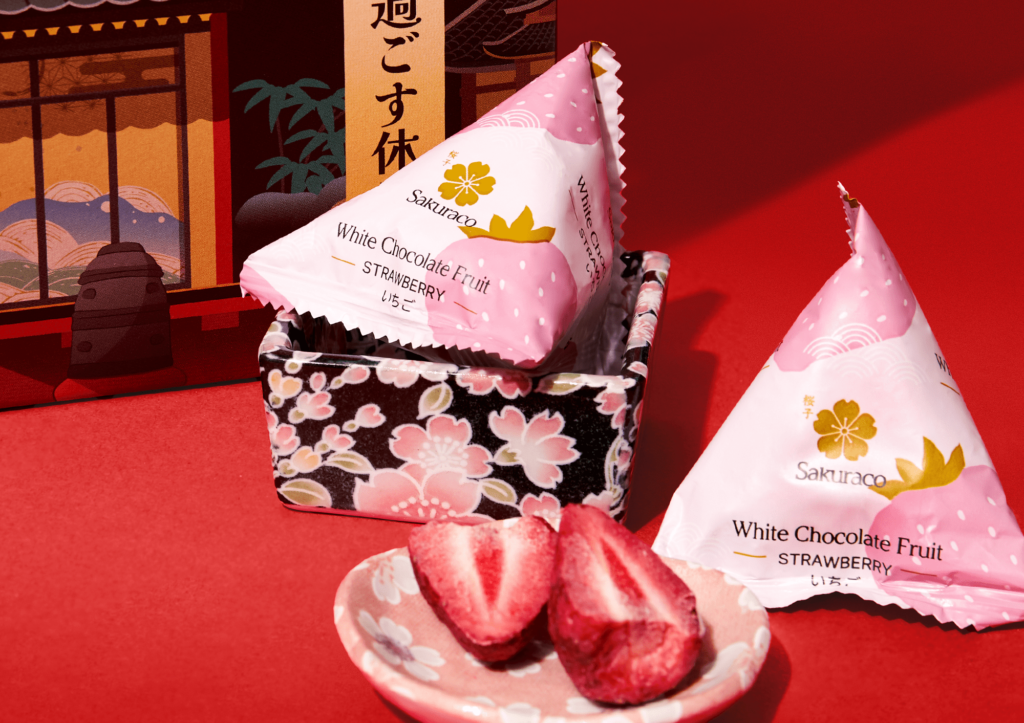
Japanese Symbols in Locations
Castle (autumn)
Japanese castles are magnificent in autumn, as vibrant foliage creates a stunning backdrop for these historic sites. Castles like Hirosaki Castle and Matsumoto Castle showcase brilliant red and yellow leaves, enhancing their charm. Many castles also host special events during this season, allowing visitors to enjoy the enchanting atmosphere of Japan’s autumn landscapes alongside its rich history.
Torii gate
Torii gates are famous symbols in Japan that mark the entrance to Shinto shrines. The are used to show the boundary between the sacred and the everyday world. Usually painted bright red, these gates are thought to keep evil spirits away and bring good luck. Their exact origins are unclear, but they may have come from ancient bird perches or influenced by structures from other countries. Walking through a torii gate feels special, as it leads you into a sacred space that connects nature and spirituality.
Japanese Symbols in Culture
Kitsune
Kitsune, or foxes, are significant figures in Japanese folklore, known for their magical abilities and cleverness. Legends say kitsune can shapeshift into human forms, often appearing as beautiful women. There are two main types: zenko, which are good and serve the Shinto deity Inari, and nogitsune, which are wild and mischievous. As kitsune age, they gain power and can grow to nine tails, becoming incredibly wise.
Furin (summer)
Furin, or Japanese wind chimes, are a beloved symbol of summer in Japan. Known for their soothing sounds that help create a refreshing atmosphere during the hot months. Typically made of glass, metal, or ceramic, these chimes hang from porches and windows, ringing gently in the breeze. The sound of furin is often associated with coolness, making it a perfect companion for the humid summer days.
Daruma
Daruma dolls are traditional Japanese symbols of perseverance and good luck, often found in homes and businesses. These round, red dolls represent Bodhidharma, the founder of Zen Buddhism. One eye is painted black, while the other is left blank. The tradition is to color in one eye when making a wish or setting a goal and then fill in the other eye once the wish comes true.
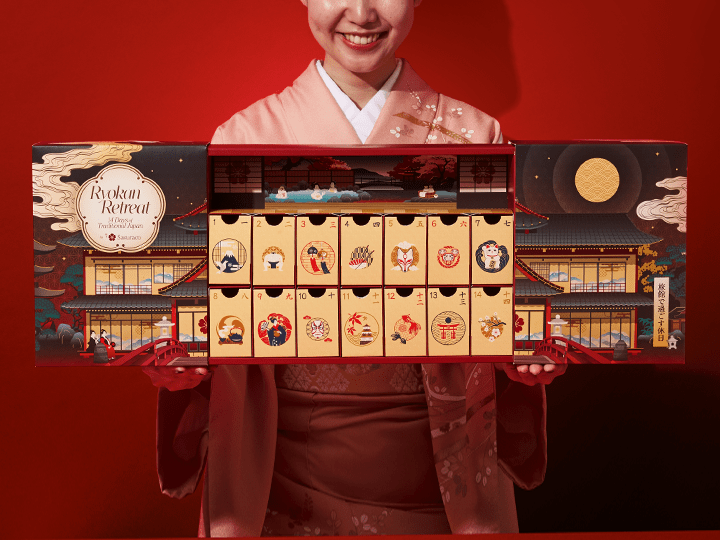
Why are these Japanese symbols important?
These symbols are important because they reflect Japan’s rich history, beliefs, and philosophies and serve as powerful communication tools. Beyond their decorative appeal, these symbols encapsulate key concepts from folklore and spirituality, enriching Japan’s cultural landscape and fostering a sense of community and shared values.
Experience your own personal Japanese symbolic keepsake with the Ryokan Retreat: 14 Days of Traditional Japan.
What do you think of these symbols in the Ryokan Retreat: 14 Days of Traditional Japan Calendar? Let us know in the comments below!


